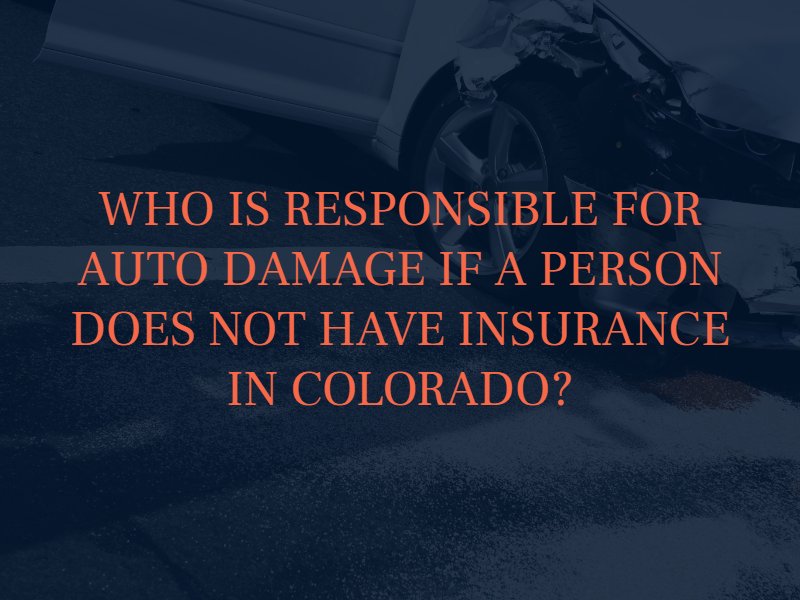Automobile insurance is mandatory in Colorado. Before a person can get behind the wheel of a motor vehicle, he or she must have adequate car insurance. The state has regulations as to the minimum amount of auto insurance required, including at least $15,000 in coverage for the other driver’s vehicle damage. Unfortunately, hundreds of drivers in Colorado still choose to unlawfully drive while uninsured or underinsured. Here’s what happens if you get into an accident with an uninsured driver.
At-Fault Party Can Be Held Responsible
Colorado is an at-fault car accident state. There are fault and no-fault laws. In Colorado and other tort-based insurance states, the driver or person who is guilty of committing a tort, or wrongdoing, that causes the car accident must pay for related damage. This includes the other driver’s medical bills and vehicle repairs. If a driver is guilty of speeding, tailgating, distracted driving, drunk driving, or another negligent or reckless act that results in a car accident, his or her car insurance company is financially responsible.
In a no-fault state, on the other hand, a driver with injuries or property damage seeks financial benefits through his or her own car insurance provider, even if he or she is not at fault. All drivers file first-party insurance claims and do not have to prove that another driver was negligent. Under Colorado law, however, you must prove the fault of the other driver. Contact a car accident attorney in Denver for assistance determining fault, gathering evidence, filing your insurance claim and proving your case for optimal results.
What Happens if the At-Fault Driver Was Uninsured?
One of the first things that you should do after a car accident in Colorado is exchange information with the other driver. This includes insurance information – the name of the driver’s car insurance company and his or her policy number. If you find out that the driver is uninsured, call the police if you have not already done so. Uninsured drivers in Colorado are subject to penalties such as fines and driver’s license suspension until they acquire insurance. Notifying the police can help prevent other people from encountering the same problem with the uninsured driver.
After a crash with an uninsured driver, you may still be able to hold the driver responsible through a personal injury or property damage lawsuit. Bringing a lawsuit against the individual driver can force him or her to pay for your vehicle damage and other losses out of pocket if he or she does not have insurance to cover the costs, such as through a lien or wage garnishment. Unfortunately, many people who drive without insurance don’t have the funds or assets to pay for vehicle repairs out of pocket.
Your other options are an uninsured/underinsured motorist insurance (UM/UIM) claim through your own car insurance provider or a claim against a third party. Your own insurance provider may pay to repair your car if you have the right type of insurance. This includes uninsured and underinsured motorist insurance, comprehensive coverage, and collision coverage. If you don’t have first-party insurance to pay for your losses, a Denver personal injury lawyer can help you search for a third party to hold responsible, such as the manufacturer of a defective vehicle part or the government for a road hazard.
What Is Uninsured Motorist Coverage?
Uninsured motorist coverage protects the policyholder if the at-fault driver doesn’t have insurance or enough insurance to pay for the crash. In Colorado, UM and UIM insurance are optional. Call your insurance provider after an accident to find out if you have UM/UIM insurance that will cover the damage. If so, the coverage that you have will fill in the gap between how much the other driver’s car insurance can pay (if any) and how much your vehicle damage will cost.
For more information about how the recovery process works after an accident with an uninsured driver in Colorado, contact Cannon Law for a free consultation.
